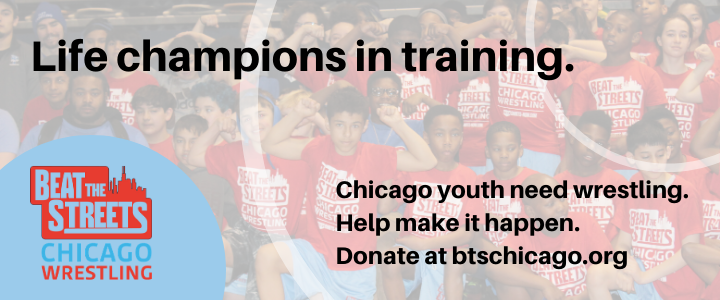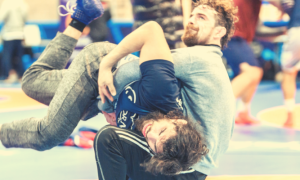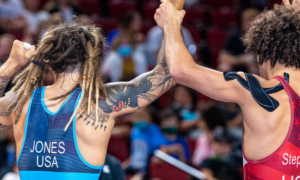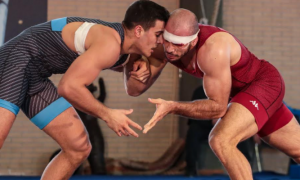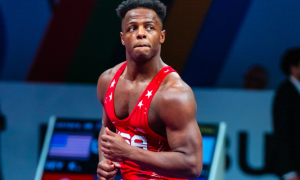He’s probably too nice to bristle at the thought of having triumphed “out of nowhere”. In order to become offended, one must first trudge around shackled to their ego. And simply put, Nate Grimes (77 kg, OPTC) doesn’t have time these days to remain trapped underneath the burden of external perspectives. Think what you want, say what you will. Outside noise rarely penetrates Grimes’ observance of his personal core values. At still just 21 years of age, he has already experienced enough wrestling-related tumult to understand which are the battles actually worth fighting.
Unsurprisingly, most of those have taken place between his own ears.
Following a high school tenure in Texas that concluded with a third-place finish at the state tournament, Grimes’ idea of wrestling soon veered towards a different, much more expansive direction. Instead of choosing to figure out a way to continue his career for a college folkstyle program, he found himself at Northern Michigan University. It was a whole new landscape, and not just in terms of topography and meteorological concerns.
Full-time Greco-Roman quickly provided Grimes with heightened aspirations. A reason to dream bigger and work harder than previously thought possible. But with that commitment came a series of challenges. Normal. Expected, especially on these shores. While most wrestlers in American colleges are consumed mainly by competition, NMU athletes are by and large trying to get a handle on unfamiliar technical finer points and how to apply them opposite uber-experienced antagonists. That Grimes tore an ACL even before he could grow fully accustomed to the myriad nuances and adjustments demanded of him didn’t exactly smooth out the road on which he was traveling. It is difficult, after all, to generate momentum with so many learning experiences unfolding at once.
The snags, the struggles, were reconciled appropriately. Grimes never assumed he was entitled to anything, so he didn’t act like it. Just as importantly, at least in terms of his sport, he didn’t compete like it, either. Victories weren’t taken for granted, no matter where they occurred. Be it against a foreigner, or in a National event, or in the practice room. Rate of progress is not nearly as vital as progress itself. For those younger athletes who are steadfastly dedicated to their craft, patience isn’t a virtue. It is a requirement. And by the time Grimes started stringing together the sort of signs which suggest a breakthrough might be on the horizon, several of his contemporaries were leapfrogging towards bigger achievements.
None of that obscured his resolve. He was shrewd enough to realize that he had no choice but to have no choice. In a seeming flash, Grimes opted to depart NMU in favor of Colorado Springs, where he could work with Coach Mohamed Abdelfatah and be closer to his family. He had taken his career in his own hands; and in spite of various COVID restrictions hindering workout plans, had hit the ground running. Grimes felt empowered. Because of that, his perception of what matters when it comes to training and development were now viewed through a clearer lens. Healthy, happy, and in an environment that offered a fit more congruent with his personality and competitive objectives, the momentum that had previously eluded him appeared more reachable than ever before.
In October, Grimes placed sixth at the US Senior Nationals to garner All-American status for the first time. He says today that he was dissatisfied with that performance, noting two mistakes he made during the tournament that helped usher in his two defeats. But he sure took advantage of the next chance he got. Just over a month later, Grimes stomped to the U23 National title by overcoming an early 4-0 deficit against two-time Open runner-up Calvin Germinaro (67 kg, Minnesota Storm, 5PM #8) to seal the deal via fall in the second period. Their finals match, with its bevy of scramble points, throw attempts, and opportunistic-yet-violent counters, presented a glimpse of how Grimes sees himself as a wrestler: if he can force positions and points, great; if not, it is still his responsibility to find a way to win, no matter what it takes, or what it looks like.
Thus, you are forgiven if this all feels so sudden. On the surface, it has been. But it is prudent to note that there is really no such thing as “out of nowhere” in wrestling. The matches, the tournaments? All but mere evidence of the preparation, enthusiasm, anguish, and sacrifice that transpire when the lights are dim and the doors are closed. Behind those doors are wrestlers like Grimes, athletes who are willing to double down on decisions made and re-appropriate adversity as a precious educational tool. That’s how he won a National crown. It is how he plans on becoming a World and Olympic Champion.
Why doubt him? He has been right so far.
5PM Interview with Nate Grimes
5PM: What was the motivating factor for your leaving NMU?
Nate Grimes: For me, it was about being able to train with Coach Mohamed (Abdelfatah), who I had trained with over the summers during the break. There is nothing wrong with Coach (Andy) Bisek or his coaching. It’s just that Coach Mohamed is very instructive and would tell not just what I was doing wrong, but also what I could do. Not just correcting me, more like, You’re not doing this, but you could. And I love that, I loved his input on things that I was already doing and I would focus on that.
Then, obviously, there are less guys here (in Colorado Springs), so there are more eyes on me and more accountability on every rep. Also, travel is cheaper because you don’t have to fly into a different airport, and traveling outside of the country is huge developmentally when it comes to Greco.
So, I factored all of that into my decision, plus my parents had also moved to Castle Rock. They moved there after I graduated from high school. I pay in-state tuition here, as well, without any aid. Monetarily, it has worked out, and I have a better situation with my housing.
Basically, #1, I wanted to come here mainly for the coaching and to be under Mohamed; #2, I wanted to come out here and find a way to make it work, and I did it. I didn’t want to look back and think that I’ve wasted time by not doing something that would help me.
5PM: How do you mean “time”? You’re only 21. Do you mean that there was a threshold related to schooling, as if to say, ‘Well, if I am going to make a move, I might as well do it right away’?
NG: Yeah, yes, if I had spent one more year at Northern Michigan I probably would have stayed there until I got my degree. Since I was still at the point where I wouldn’t take a complete bath by transferring my credits, I figured, Now is the time to do it.
Another factor, and I do not want to say anything negative about Northern, but they lost a lot of athletes around my size. Carter Nielsen, Spencer Woods, Barrett Stanghill… Those are three dogs I just named who are no longer there, but they were there. I knew they weren’t going to be there the next year. So, that was another thing, In Colorado, at least I won’t miss out on partners I would have had here, because most of them were going to be gone.
5PM: At NMU, you did get your first taste of overseas competition, which is one of the most attractive components of that program. How did those early experiences influence your perspective of this sport, as constituted elsewhere outside of the United States?
NG: It definitely opened my eyes to what I think is going on upstairs, and how important that is. It isn’t just your mindset going into a match, it is also your ability to wrestle and feel at home simply because you’re wrestling. If you are in a different country, you’re seeing it as, I’m in a different place and I’m wrestling a guy who isn’t an American, he doesn’t wrestle how I’m used to… When you’re thinking about all of these things, you are automatically putting the advantage in their hands. That was huge for me to learn, what a real advantage is, and I think the biggest advantage is your mentality.
I definitely think that is something I learned overseas. I had my ACL tear and then went over to Sweden, and didn’t wrestle very well. I wrestled my own teammate over there, and I think tasting those losses was really big for me because I didn’t like how they tasted. They helped me make the decision that I wanted to be way better than I was. Not just better, I wanted to step up multiple levels because I saw that there weren’t many other levels to this sport that I love.
Obviously, it helped my technique seeing all of these other styles, a lot more disciplined stances, and everything along those lines. But more than that, it helped me remember that this is just wrestling. Even when you are lacing up your shoes in another country, it is what you love to do and you are just doing what you practiced.
5PM: Sometimes, if not often, wrestlers who are breaking into full-time Greco struggle because in high school they won many, many more matches than they lost and then all of the sudden, it is different. They are facing higher-skilled athletes and foreigners, and they are are dropping matches at a higher rate. Is is tough to see that these matches, particularly overseas, are more about education than they are necessarily victory?
NG: That was super-hard because it was never about that in my own head. Obviously, goal-wise, the end goal, is to always get better. But — in the moment, you want to win. You always want to win, in every moment. And if that ever changes, I feel like you’re not in the right sport. On that note, when you aren’t winning, you have no choice but to learn.
I think that was still true, I’m traveling and I’m spending all of this money and realizing that part of this sucks. Like, This sucks, I am literally purchasing this. At the same time, I also saw it as, I’m investing in my future and when I’m in the prime of my career, I will have already learned these lessons.
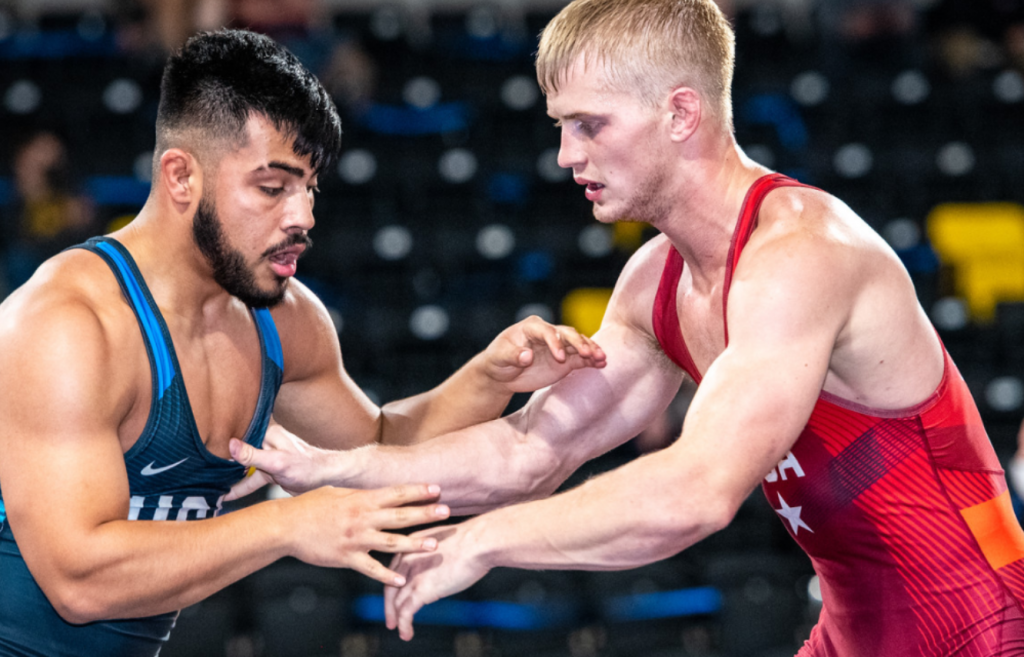
Grimes (red) and former teammate Riley Briggs combined for a contentious 7-7 criteria decision that went to Grimes at the US Open this past October. The match, which took place in the consolation bracket, was one of the most exciting of the tournament. A month later, the pair met again, this time in the U23 Nationals, and Grimes triumphed 7-2. (Photo: Sam Janicki)
5PM: What has it been like for you having to deal with the situation in Colorado Springs thus far? The OTC (Olympic & Paralympic Training Center) still hasn’t re-opened its doors and you have had to manage by training outside and getting mat time wherever and whenever you can. How have you stayed motivated?
Nate Grimes: Do you want to hear something awesome?
5PM: Sure.
NG: I literally didn’t care at all when we first got here that I couldn’t wrestle at the OTC. I didn’t think about for a single second all of the equipment I don’t yet have access to, the meals, the trainers I can’t see, the treatment and recovery tools — I didn’t think about any of that until after I won Nationals. And I think that is because I was so focused every single day at practice on not making any excuses for myself and just trying to take advantage of that moment. That way, I could do all that I sacrificed by coming here to do.
There was a lot I liked about Michigan. There were people who I liked there and a lot of things that I loved. But here, I was doing this for wrestling. As soon as I came here, it was, Okay, at least I have the ability to wrestle. In July it was, At least I can finally practice. So, I didn’t care that we were outside. I saw it as, I need to work on my feet, anyway. I don’t need par terre right now, until we went inside. Then it was, I don’t care that I have to drive 15 minutes to practice, I’ll use this time to focus while I’m driving. Not for a minute did I let the circumstances of being unable to train at the OTC affect my mindset.
But after Nationals, I began thinking about all of the things I took for granted whenever I had them. That was important, realizing all of the things I once had and hopefully will get back eventually.
5PM: Let’s hit on the U23 Nationals and your title. First, there is the weight category. You’re 77 at Senior now but this tournament was back at 72, and you looked bigger than in the past. You looked like a beast.
NG: I definitely felt stronger but I think it was just more because I was. I was a little bigger. Obviously, I have gotten a lot better at my wrestling, and I think being stronger and finally understanding how I want to do this was just such an eye-opener for me. Scoring points at will whenever I got the opportunity… It was just so much easier to score on those guys — and I’m not saying that in disrespect to their ability. It was easier to score because I had more mass and was able to weigh what I weighed. I feel like I could have wrestled the guys at a heavier weight class, and I did with Riley (Briggs), and I just, like you said, felt a lot stronger. I really did.
But I definitely did put on some muscle. As I said earlier, I am just trying to deal with the circumstances I have instead of wishing for different ones. I’m at 77 right now, so I have to be a big boy.
5PM: You know what it is like to enter a tournament and leave without a result you are pleased with. What is it like to enter a tournament at this level and not only get the result you want, but leave with your first National title?
Nate Grimes: That’s a good question, because at first it was kind of hard for me. I have been in moments during matches where you know you have the ability, you know you have the time to score the points you need to score, and have the ability to hit the moves to score you those points. But for whatever reason, on match day, it is like that belief in myself wasn’t built up in the past. I think I never made it to that big match because other guys were more ready for it.
It wasn’t until after I became confident enough in my own style, what I like to do, and my own goals, that I started to think that I deserved it. As soon as I believed that I deserved it, I just waited for my moment. My initial reaction — and obviously my opponent was really tough — was that I absolutely loved the feeling of hard work paying off. Setting out to do something while knowing that you can do it, not doubting yourself at any point in the process, and then doing it is something that I had never done before. Never. And that feeling was amazing.
Afterwards, the best thought that I had was, Okay, it’s real. What’s next? And the answer to that is the next big thing, which is placing higher at Seniors every chance I can possibly get. That is getting on top of the podium every chance I can get to do that. Flashback to the tournament before (Senior Nationals), that was the first time that I had actually All-American’ed, in my opinion of what that truly means. I was really proud of that, but after I was also really dissatisfied because there were two matches I lost in that tournament, and those hurt because they were mental for me. It was like, You just made mental mistakes — twice. Or more than twice, but the matches I am specifically referring to were twice. But I was so much more prepared for the next tournament after having those close battles at Senior and knowing that you don’t need to panic. If you’re sticking to your game plan, the points will come.
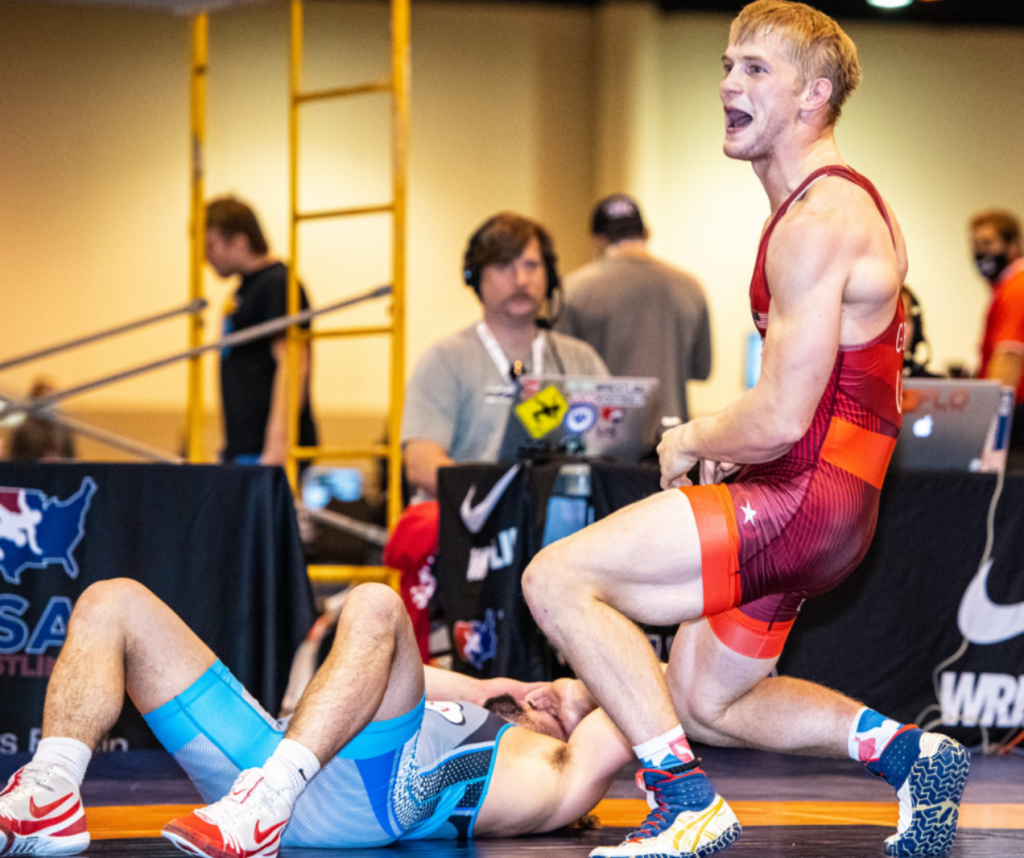
After Calvin Germinaro jetted out to an early lead in the 2020 U23 National finals, Grimes went on his own tear and eventually prevailed via fall in the second period. (Photo: Sam Janicki)
5PM: Coming from those tournaments and since Mohamed is essentially your personal coach, what were those conversations between you and him like?
NG: He told me specifically what to do in my matches the day of. He didn’t even have to say it. I knew, because I feel like with the structure of our practices and the consistency that he provides, I knew what was expected of me and what I could accomplish with my energy level and all of the preparation that I had. With Mohamed, it was all about sticking to the game plan that we had been developing. Stick to what we know we want to do. At no point was it like, That didn’t work the first period; completely change it, or Okay, Nate, go for this move. It was more like, Okay, that was a little different of a look than we were expecting, let’s just change our look because we have more looks that we can give. We saw at it as, This is the day we put together what we have been practicing.
I felt like that whole week, that whole month, and the months prior were so great because we were competition-focused. We weren’t out here wrestling matches in practice afraid to give up points. No. We were figuring out everything we needed to do to put our offense together for match day.
5PM: Among that OTC group, you do have a few elder statesmen involved around your weight, including RaVaughn Perkins. What kind of influence has RaVaughn been for you since you’ve been out there?
NG: The biggest thing that I get from wrestling RaVaughn is that experience. You can tell when RaVaughn wants to score in practice. You can feel that experience. He doesn’t approach you in a way where you know what he’s going for. He knows how to drive forward to create the action and his angles. Working with RaVaughn — and specifically Matt (Lindland), because that is who I work with whenever I work with RaVaughn — provides a great contrast to working with Mohamed because they completely agree on what good position is, but they don’t always necessarily agree on tactics. Whenever I wrestle with RaVaughn, it is a completely different look from when I wrestle with Tommy (Brackett), Brandon (Mueller), or one of my other teammates.
So first, it is a different feel whenever I work with RaVaughn, but also there is a different input that I am getting from Coach Lindland. I have these tools that I get from them and can use in my other practice, and there are tools from those practices I can try on RaVaughn. My partners I feel are less prepared for what I am going to do because we’re not all getting coached on the exact same things. That experience gives me a higher understanding of what these older guys are going to do.
I’ll give you a prime example: after our first go at a practice one time, RaVaughn was pissed because it was pretty low-scoring. Matt was really trying to motivate him to get some points. So in the second period, RaVaughn comes out super, super aggressive. In a manner of which I wasn’t really used to and will always remember. Because, I don’t get shucked around like that. The fact that I got shucked around like that in a practice was huge because now in a match when that second period starts, that is the first thing I am thinking about. If he is sprinting at you, you have to be ready to make better first contact than him. I’m not the type of person who likes to sprint into people. I like to be under control, so sometimes those more explosive athletes catch me off-guard.
5PM: Some wrestlers prefer uniformity among the voices in their ears so I wonder if this ever gets challenging. Do you benefit from drawing feedback on the part of multiple sources?
NG: I really think that I do because I have established a base now — and as soon as I got that base, anyone can tell me anything. I at least know my base, and that’s great. Whereas before, I didn’t really know what my base was. So if someone told me to, say, attack the wrist, if my feet weren’t positioned the right way or my waist wasn’t, then what good is attacking the wrist? Even if you could do that amazingly, what good is it? It’s not good. You have to have your base first, you know? Which to me, a base is a good stance, a really good push, and just good positioning. If you don’t have that, you’re not going to be able to develop a good offense.
I think for a long time that I was so focused on my developing my offense that I didn’t build my base. As soon as I fixed that, now I have loved having multiple sources. Before, I don’t think I would have. You have one person telling you this, another telling you that. Once you learn what you need to focus on as your base — your stance, your go-to attacks — then I think you can really benefit from anyone spit-balling any ideas. Then, you can try them. And then you know whether or not they are for you, because now you have that base.
5PM: How do you navigate preparing and peaking for two big tournaments that are in succession, and not far away? Also, how have you harnessed momentum coming out of the fall?
Nate Grimes: Every time leading up to tournaments, I think about good position and generally what I like to do. In practice, I focus on the obvious stuff. I also think about what I get scored on, I think about the battle. I think about my basic offense and my par terre, what I have been improving on in practices.
As far as mindset goes, every single day I tell myself, If you get scored on today in practice, who cares? If you can’t get this lift, who cares? You know what you’re working on to get better and score in matches. You can’t always have good practices; and if you do, you’re not pushing yourself in the weight room or you don’t have good-enough partners. But you shouldn’t always be doing well in practice.
Also, on certain days, remembering that you might be focusing on something else. So if you’re focusing on that, have the discipline to remain focused on that, which is huge. I think so many wrestlers get caught up in focusing on their offense that they are reaching out left, reaching out right, or reaching behind. They are trying to get offense from every position, and that’s so wrong. You know that the reaction time to hit something is really quick, and if there are a bunch of options you have in your mind then you are going to feel landlocked with no decisions. As long as you are sticking to what fits you, then I think that’s great. That will bring you the confidence you need on match day.
When match day comes, I’m not focusing on winning or whatever the goal is. I’m focusing on being thankful to compete, which gives me a sense of calm. And I am really dangerous when I’m calm.
Follow Nate Grimes on Twitter and Instagram for updates on his career and competitive schedule.

Listen to “5PM44: Michael Hooker and Toby Erickson join the show” on Spreaker.
Listen to “5PM43: Christmas Time with Millersville’s Kerry Regner” on Spreaker.
SUBSCRIBE TO THE FIVE POINT MOVE PODCAST
iTunes | Stitcher | Spreaker | Google Play Music
SUBSCRIBE TO THE FIVE POINT MOVE PODCAST
iTunes | Stitcher | Spreaker | Google Play Music

Notice: Trying to get property 'term_id' of non-object in /home/fivepointwp/webapps/fivepointwp/wp-content/themes/flex-mag/functions.php on line 999


